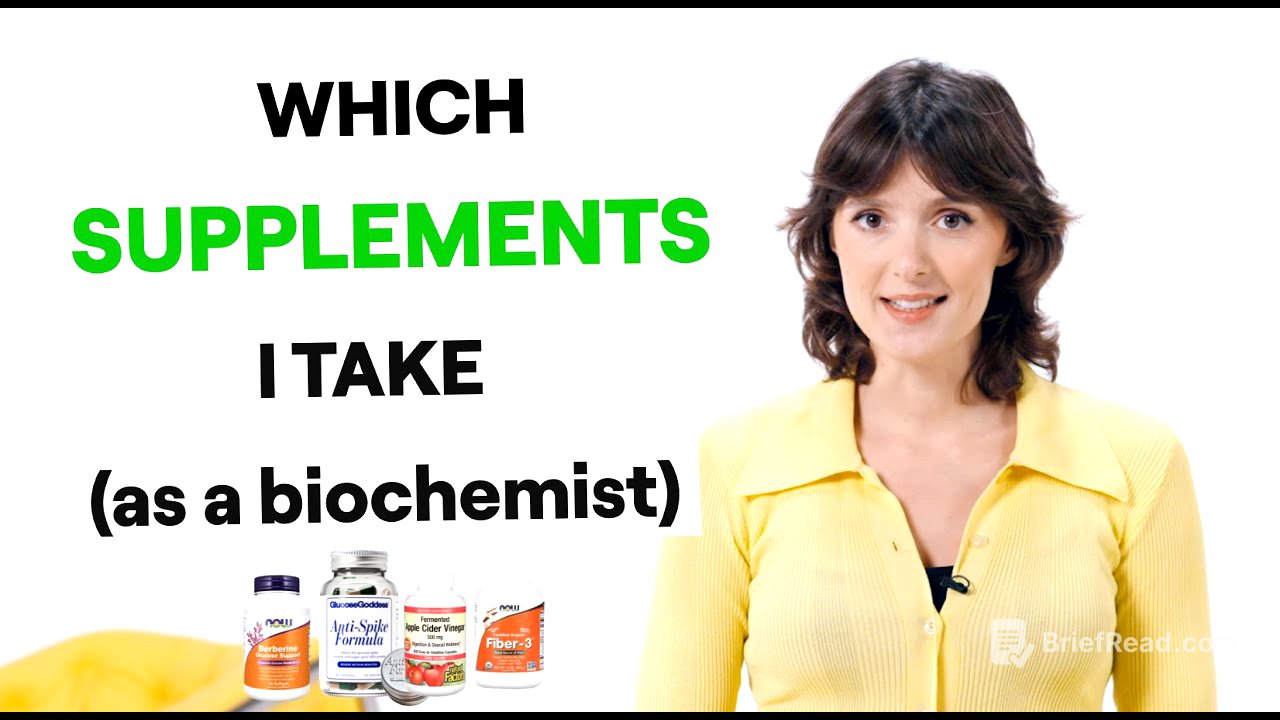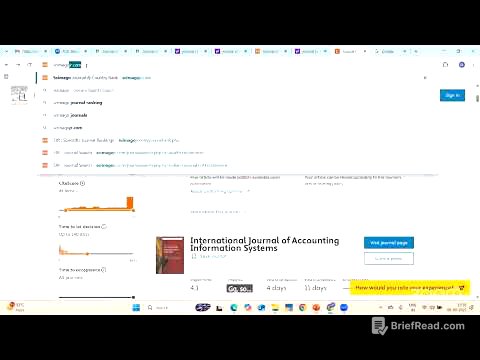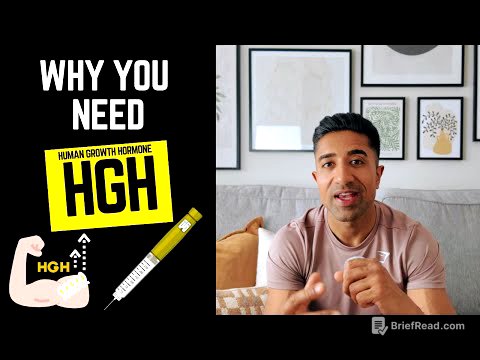TLDR;
This video discusses natural supplements for managing glucose levels, with a focus on what the author, Jesse Inrsoupe, does and doesn't take. She explains why she avoids certain popular supplements like vinegar capsules, vinegar gummies, fiber pills, bitter melon, and berberine, detailing their drawbacks and limited effectiveness based on scientific studies. Jesse then introduces her preferred supplement stack, highlighting two key ingredients: mulberry leaf extract and lemon extract (eriocitrin). She details their mechanisms of action, benefits supported by clinical trials, and how they work synergistically to reduce glucose spikes, improve insulin sensitivity, and offer long-term health advantages.
- Avoids vinegar capsules, gummies, fiber pills, bitter melon and berberine due to limited effectiveness and drawbacks.
- Highlights mulberry leaf extract and lemon extract (eriocitrin) as key ingredients in her supplement.
- Explains the mechanisms of action, benefits, and supporting clinical trials for these ingredients.
Intro [0:00]
Jesse Intrsoupe introduces herself as a French biochemist focused on helping people understand their bodies and health, particularly concerning glucose levels. She explains that managing glucose spikes is fundamental to physical and mental well-being. The video will cover natural supplements that can help with glucose levels, including those she avoids and the specific supplement formula she has designed and takes daily.
What Actually Works for Glucose Spikes? [0:51]
Jesse transitions into discussing specific supplements, starting with those she does not use and explaining why based on scientific evidence. She emphasizes the importance of understanding the science behind supplements to make informed choices about managing glucose levels.
Why I Don’t Take Vinegar Capsules [1:34]
Jesse explains that while regular vinegar can cut the glucose spike of a meal, vinegar capsules are not effective. A study comparing liquid vinegar to vinegar pills showed that liquid vinegar improves insulin resistance, while the capsulated form does not and may even worsen it. The evidence supporting the effectiveness of vinegar capsules is insufficient, leading her to avoid them.
Vinegar Gummies Are Pure Marketing [2:34]
Jesse advises against taking vinegar gummies because they contain added sugar, which can worsen glucose levels. She explains that there is not enough evidence that vinegar in non-liquid form works, and the added sugar in gummies negates any potential benefits. She dismisses vinegar gummies as a marketing gimmick that does not effectively manage glucose spikes.
Why I Skip Fiber Capsules [3:50]
Jesse addresses the question of whether fiber pills can replace eating vegetables at the beginning of a meal to reduce glucose spikes. While technically possible, she notes that a large quantity of fiber pills is needed to match the fiber content of a cup of broccoli. For example, six psyllium husk capsules are equivalent to one cup of broccoli. She finds this tradeoff impractical, especially since other supplements work better for reducing glucose spikes.
Bitter Melon: What the Research Says [5:10]
Jesse discusses bitter melon, a popular supplement for glucose management. She cites a systematic review and meta-analysis that found supplementing with bitter melon for 4 to 12 weeks did not significantly lower HbA1c or blood sugar in people with type 2 diabetes compared to a placebo. Another review showed a slight improvement in HbA1c (0.3%), but she considers this insufficient to justify daily use.
Berberine: Pros and Cons [6:41]
Jesse examines berberine, another popular supplement for glucose levels. A systematic review and meta-analysis showed that two grams of berberine daily for two months improved fasting glucose levels. However, she outlines several drawbacks: the need to take many pills (8-10 daily), a two-month wait for noticeable effects, no impact on immediate glucose spikes after meals, and potential safety concerns regarding high doses over long periods.
What I Was Really Looking For in a Supplement [8:49]
Jesse explains that she wants a supplement that will help reduce the spike of a meal when she needs it.
The First Hero Molecule: Mulberry Leaf Extract [9:36]
Jesse introduces mulberry leaf extract as one of the two plant molecules she takes daily. The leaves from mulberry trees contain DNJ, a molecule that is very helpful for glucose spikes. A review of 12 clinical trials involving over 600 people showed the impact of mulberry leaf extract on glucose spikes. Mulberry leaf has been used in Chinese medicine for a long time.
How Mulberry Slows Glucose Absorption [11:10]
Jesse explains how mulberry leaf extract works. DNJ interacts with alpha-glucosidase enzymes in the stomach and intestine, which are responsible for breaking down starches into individual glucose molecules. DNJ slows down the conversion of starches into glucose, reducing the glucose spike. This process allows for slower glucose absorption, similar to the effect of her other glucose hacks.
Study: 40% Reduction in Glucose and Insulin Spikes [13:11]
Jesse cites a study showing that 250 milligrams of mulberry leaf extract reduced glucose and insulin spikes by up to 40%. This reduction is significant because lowering glucose spikes without increasing insulin levels avoids negative consequences associated with high insulin levels.
How Mulberry Reduces Cravings, Fatigue & Inflammation [14:22]
Jesse details the immediate benefits of reducing glucose spikes with mulberry leaf extract, including reduced cravings due to smaller glucose dips, improved energy levels, and less inflammation. Big glucose spikes and dips increase inflammation and cause fatigue, which mulberry leaf extract helps to mitigate.
Long-Term Benefits of Mulberry Leaf [15:06]
Jesse discusses the long-term benefits of daily mulberry leaf extract consumption. A meta-analysis showed that after two months of taking 250 milligrams of mulberry leaf extract daily, participants experienced a reduction in fasting blood glucose, HbA1c, and fasting insulin levels.
Why I Created Anti-Spike Formula [15:59]
Jesse explains that due to the evidence and impact on both short-term glucose spikes and long-term glucose health indicators, mulberry leaf extract is the number one thing she takes every day. She has included it as a key ingredient in her Anti-Spike formula, ensuring a high-potency, high-quality extract with the clinically proven dose of 250 milligrams per daily dose.
Can You Use Mulberry Tea Instead? [17:03]
Jesse addresses whether mulberry leaf tea can replace the extract. While mulberry leaf tea is fine to drink, it does not provide a sufficient amount of DNJ to have the same effect as the concentrated extract in Anti-Spike formula.
Second Hero Molecule: Lemon Extract (Eriocitrin) [17:22]
Jesse introduces lemon extract (eriocitrin) as the second plant molecule she includes in her daily routine. Eriocitrin, the molecule that makes lemons yellow, acts on L cells in the digestive tract, which produce GLP-1 when they sense food.
How Lemon Boosts GLP-1 Production [18:25]
Jesse explains that eriocitrin helps L cells produce more GLP-1, a natural substance that regulates appetite and improves glucose levels. Supplementing with 200 milligrams of eriocitrin for three months can increase GLP-1 production by up to 17%. Higher GLP-1 levels reduce cravings and help the body store excess glucose.
Study: Reversing Prediabetes with Lemon Extract [20:24]
Jesse cites a study where 24% of pre-diabetic participants reversed their condition by supplementing with 200 milligrams of eriocitrin daily. This highlights the potential of eriocitrin to improve fasting glucose levels and overall glucose health.
Why Lemon Juice Isn’t Enough [21:42]
Jesse clarifies that drinking lemon juice is not a sufficient substitute for eriocitrin supplementation. One would need to drink two liters of lemon juice daily to obtain 200 milligrams of eriocitrin, making supplementation a more practical approach.
The Power of the Combo: Mulberry + Lemon [22:02]
Jesse emphasizes that the combination of mulberry leaf extract and eriocitrin from lemons is the best way to help with glucose spikes immediately and build long-term positive benefits in the body. She takes this combination daily and has included it in her Anti-Spike formula, which provides the clinical doses of both ingredients.
Bonus Ingredients: Cinnamon & Antioxidants [22:58]
Jesse mentions that Anti-Spike also includes a high-potency extract of cinnamon, equivalent to one gram, for its long-term benefits on glucose levels, and a mix of veggie antioxidants for overall wellness.
Why This is the Only Supplement I Take Daily [23:58]
Jesse concludes that Anti-Spike is the only supplement she takes daily. It offers more powerful long-term effects than berberine with fewer capsules and provides immediate reduction in glucose and insulin spikes.
Final Thoughts: What Changed for Me [24:18]
Jesse shares that adding Anti-Spike to her routine has helped with bloating, prolonged feelings of fullness, and eliminated cravings for sweets. She expresses her pride in the product and its effectiveness.
Testimonials & Real-Life Results [25:05]
Jesse concludes the episode with video testimonials from people who have tried Anti-Spike. She encourages viewers to visit anti-spike.com to see more testimonials, review the science, and learn more about the product.









